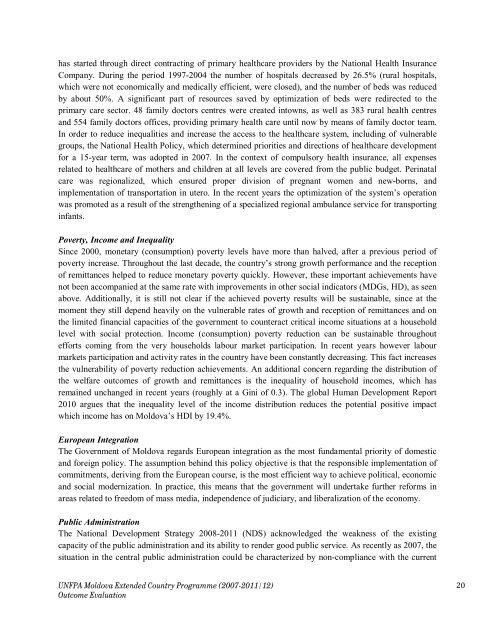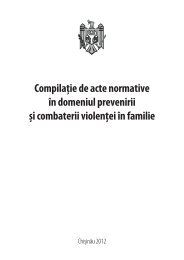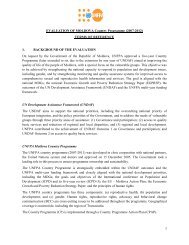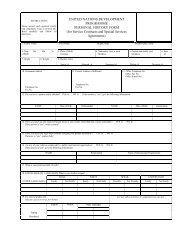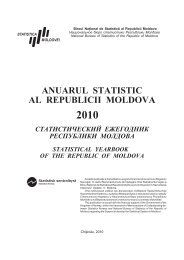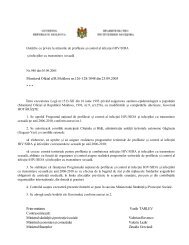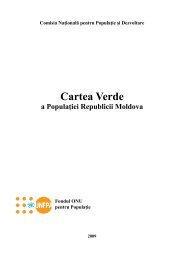Country Programme (2007-2011/2012) evaluation - UNFPA Moldova
Country Programme (2007-2011/2012) evaluation - UNFPA Moldova
Country Programme (2007-2011/2012) evaluation - UNFPA Moldova
You also want an ePaper? Increase the reach of your titles
YUMPU automatically turns print PDFs into web optimized ePapers that Google loves.
has started through direct contracting of primary healthcare providers by the National Health Insurance<br />
Company. During the period 1997-2004 the number of hospitals decreased by 26.5% (rural hospitals,<br />
which were not economically and medically efficient, were closed), and the number of beds was reduced<br />
by about 50%. A significant part of resources saved by optimization of beds were redirected to the<br />
primary care sector. 48 family doctors centres were created intowns, as well as 383 rural health centres<br />
and 554 family doctors offices, providing primary health care until now by means of family doctor team.<br />
In order to reduce inequalities and increase the access to the healthcare system, including of vulnerable<br />
groups, the National Health Policy, which determined priorities and directions of healthcare development<br />
for a 15-year term, was adopted in <strong>2007</strong>. In the context of compulsory health insurance, all expenses<br />
related to healthcare of mothers and children at all levels are covered from the public budget. Perinatal<br />
care was regionalized, which ensured proper division of pregnant women and new-borns, and<br />
implementation of transportation in utero. In the recent years the optimization of the system’s operation<br />
was promoted as a result of the strengthening of a specialized regional ambulance service for transporting<br />
infants.<br />
Poverty, Income and Inequality<br />
Since 2000, monetary (consumption) poverty levels have more than halved, after a previous period of<br />
poverty increase. Throughout the last decade, the country’s strong growth performance and the reception<br />
of remittances helped to reduce monetary poverty quickly. However, these important achievements have<br />
not been accompanied at the same rate with improvements in other social indicators (MDGs, HD), as seen<br />
above. Additionally, it is still not clear if the achieved poverty results will be sustainable, since at the<br />
moment they still depend heavily on the vulnerable rates of growth and reception of remittances and on<br />
the limited financial capacities of the government to counteract critical income situations at a household<br />
level with social protection. Income (consumption) poverty reduction can be sustainable throughout<br />
efforts coming from the very households labour market participation. In recent years however labour<br />
markets participation and activity rates in the country have been constantly decreasing. This fact increases<br />
the vulnerability of poverty reduction achievements. An additional concern regarding the distribution of<br />
the welfare outcomes of growth and remittances is the inequality of household incomes, which has<br />
remained unchanged in recent years (roughly at a Gini of 0.3). The global Human Development Report<br />
2010 argues that the inequality level of the income distribution reduces the potential positive impact<br />
which income has on <strong>Moldova</strong>’s HDI by 19.4%.<br />
European Integration<br />
The Government of <strong>Moldova</strong> regards European integration as the most fundamental priority of domestic<br />
and foreign policy. The assumption behind this policy objective is that the responsible implementation of<br />
commitments, deriving from the European course, is the most efficient way to achieve political, economic<br />
and social modernization. In practice, this means that the government will undertake further reforms in<br />
areas related to freedom of mass media, independence of judiciary, and liberalization of the economy.<br />
Public Administration<br />
The National Development Strategy 2008-<strong>2011</strong> (NDS) acknowledged the weakness of the existing<br />
capacity of the public administration and its ability to render good public service. As recently as <strong>2007</strong>, the<br />
situation in the central public administration could be characterized by non-compliance with the current<br />
<strong>UNFPA</strong> <strong>Moldova</strong> Extended <strong>Country</strong> <strong>Programme</strong> (<strong>2007</strong>-<strong>2011</strong>/12)<br />
Outcome Evaluation<br />
20


